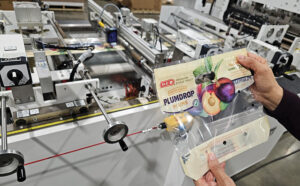Fox Packaging eliminates PFAS from packaging
Fox Packaging has eliminated per- and polyfluoroalkyl substances (PFAS) from its flexible packaging options, the company said in a March 4 news release.
The Food and Drug Administration has authorized certain PFAS for limited use in cookware, food packaging and food processing equipment since the 1960s.
On Feb. 28, the FDA announced that materials containing PFAS will no longer be sold for food packaging in the U.S.

Known as “forever chemicals” because of their persistence in the environment, PFAS have been linked to reduced immune system function and vaccine response in infants and children, increased incidence of gestational diabetes and other pregnancy complications, and testicular and kidney cancer, among other health problems, according to the National Institutes of Health.
Several states have enacted regulations restricting the sale, distribution or manufacture of food packaging containing PFAS. These regulations address the intentional addition of PFAS in food packaging materials, according to the Fox Packaging release.
“PFAS are harmful chemicals that can contaminate the environment and affect human health,” Iliana Csanyi, materials engineer specialist at Fox Packaging, said in the release. “By eliminating them from our products and processes, we have shown our commitment to sustainability and social responsibility.”
Processing aids such as fluorinated polypropylene are beneficial to food packaging, according to the release. Alternative chemicals do not currently exist in quantity and quality necessary to replace fluorinated PPA, the release stated.
“Material selection requires a careful balance between compliance with state laws and maintaining the functionality and performance of our flexible packaging,” Aaron Fox, vice president of Fox Packaging, said. “Evaluating alternatives for specific properties, such as barrier properties or heat resistance, becomes a meticulous task. Exploring alternative processing aids and adjusting existing processes to align with regulations are integral aspects of this collaborative effort.”







